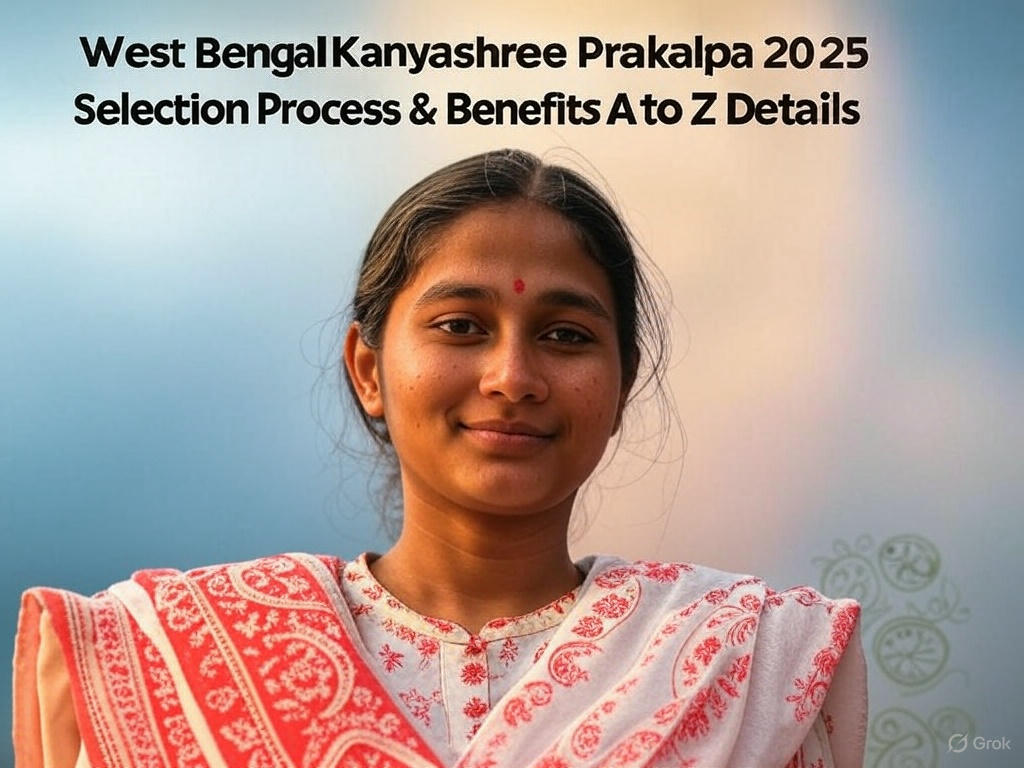West Bengal Kanyashree Prakalpa 2025: A to Z Details
A – About the Scheme
Kanyashree Prakalpa is designed to improve the status and well-being of girls by providing financial assistance for education, reducing school dropouts, and preventing child marriage. It targets girls aged 13-19 from socio-economically weaker families in West Bengal.
B – Benefits
- K1 (Annual Scholarship): ₹1,000/year for unmarried girls aged 13-18, enrolled in Class 8 or above.
- K2 (One-Time Grant): ₹25,000 for unmarried girls aged 18-19 pursuing education, vocational training, or sports.
- K3 (Postgraduate Scholarship): ₹2,000-₹2,500/month for girls in postgraduate courses (Science: ₹2,500; Arts: ₹2,000) with at least 45% in UG.
- Additional Perks: Financial inclusion via bank accounts in girls’ names, empowerment programs (e.g., Kanyashree Clubs).
C – Current Status (March 19, 2025)
- Over 82 lakh girls enrolled since inception (per 2024 data); 2025 targets further expansion.
- AI integration (announced March 2025) enhances verification and payment accuracy.
- Latest disbursal: February 2025 (K1/K2); K3 ongoing monthly.
D – Documents Required
- Aadhaar Card (mandatory for e-KYC).
- Birth Certificate (age proof).
- Bank Passbook (account in girl’s name).
- Income Certificate (family income < ₹1,20,000/year, if applicable).
- School/College Enrollment Certificate.
- Unmarried Status Declaration.
- Disability Certificate (if applicable).
E – Eligibility Criteria
- Residency: Permanent resident of West Bengal.
- Age:
- K1: 13-18 years.
- K2: 18-19 years.
- K3: No upper age limit (postgraduate students).
- Education:
- K1: Enrolled in Class 8 or above (government-recognized school).
- K2: Pursuing education/vocational/sports training.
- K3: UG degree with 45%+, enrolled in PG.
- Marital Status: Unmarried (K1, K2).
- Income: Family income ≤ ₹1,20,000/year (waived for orphans, special needs girls, or JJ Home inmates).
F – Features
- Conditional cash transfers via DBT.
- No application fee; free forms (K1: green, K2: blue).
- AI-driven verification for 2025 ensures faster processing.
G – Goals/Objectives
- Promote girls’ education up to age 18+.
- Prevent child marriage and its risks (e.g., early pregnancies, malnutrition).
- Empower girls socially and economically.
H – How to Apply
- Collect Form: Obtain K1 (green) or K2 (blue) forms from school/college (free).
- Fill Details: Provide personal, educational, and bank info.
- Attach Documents: Submit with required proofs.
- Submit: To Head of Institution (HOI) for verification.
- Acknowledgment: Receive slip with Application ID.
- K3: Apply online via wbkanyashree.gov.in (postgraduate portal).
I – Important Dates (Tentative for 2025)
- K1/K2 Registration: Year-round; processed before installment cycles (April, August, December).
- K3 Application: January-March 2025 for new PG students.
- Payment: K1/K2: April, August, December; K3: Monthly.
J – Job Impact
Supports education, indirectly boosting employability and reducing poverty among women.
K – Key Updates (2025)
- AI integration (March 2025) for faster name inclusion and error correction (e.g., bank details).
- K3 expansion to more PG students announced in Budget 2025-26.
L – Levels of Kanyashree
- K1: Annual scholarship for secondary education.
- K2: One-time grant for higher education transition.
- K3: Monthly aid for postgraduate studies.
M – Monitoring Status
- Visit wbkanyashree.gov.in > “Track Application.”
- Enter Application ID, Year, DOB, and Captcha.
- View status (approved/pending/rejected).
N – Notification
- Expected updates via wbkanyashree.gov.in (April 2025 for annual cycle).
- AI enhancement announced March 6, 2025, per posts on X.
O – Official Website
- Primary Portal: wbkanyashree.gov.in
- Helpline: 033-23373846, [email protected].
P – Payment Process
- K1/K2: Disbursed thrice yearly via DBT (April, August, December).
- K3: Monthly transfers to Aadhaar-linked accounts.
- Requires e-KYC completion.
Q – Quick Facts
- Launched: October 1, 2013.
- Beneficiaries: ~18 lakh/year (K1), 3.5 lakh/year (K2), growing K3 base.
- Awards: UNESCO Public Service Award (2017).
R – Registration Process
- K1/K2: Offline via educational institutions.
- K3: Online through Kanyashree portal post-K2 approval.
- Requires Aadhaar and bank linkage.
S – Selection Process
- Application Submission: Via school/college (K1/K2) or online (K3).
- Verification:
- HOI verifies enrollment, age, and marital status.
- District/Block officers cross-check documents.
- AI system (2025) validates data (e.g., Aadhaar, bank details).
- Approval:
- K1/K2: Added to beneficiary list for next installment.
- K3: Approved post-UG marks verification.
- Rejection: If ineligible (e.g., married, income > ₹1,20,000 unless exempted).
- Final List: Published on wbkanyashree.gov.in; payments follow.
T – Table of Benefits & Eligibility
| Level | Benefit | Age | Eligibility |
|---|---|---|---|
| K1 | ₹1,000/year | 13-18 | Class 8+, unmarried, income ≤ ₹1,20,000 |
| K2 | ₹25,000 (one-time) | 18-19 | Education/training, unmarried |
| K3 | ₹2,000-₹2,500/month | 19+ (PG) | 45%+ in UG, enrolled in PG |
U – Updates (2025)
- AI-driven verification reduces processing time (90 days max per WB Right to Public Services Act).
- K3 applications opened for 2025-26 PG batch (January 2025).
V – Verification
- Manual: By HOI and district officials (enrollment, age).
- AI: Cross-checks Aadhaar, bank, and income data (new in 2025).
- e-KYC: Mandatory via OTP/biometric.
W – Who Can Apply
- Girls aged 13-19 (K1/K2) or PG students (K3) from West Bengal.
- Economically weaker families (income cap waived for special cases).
X – X-Factor
- AI integration (2025) ensures transparency and speed.
- Focus on empowerment beyond cash (e.g., Kanyashree Day, August 14).
Y – Yearly Impact
- 2024: 18 lakh K1, 3.5 lakh K2 beneficiaries.
- 2025 Goal: Reach 20 lakh+ girls with AI-enhanced efficiency.
Z – Zero Barriers
- No cost for forms or registration.
- Income criterion waived for orphans, disabled girls, JJ Home residents.
Notes
- Selection Process: AI integration (March 2025) speeds up verification, fixing errors like bank mismatches instantly. Manual checks by institutions remain key for initial eligibility.
- Benefits: K1/K2 disbursals occur thrice yearly; K3 is monthly, enhancing PG access.
- 2025 Specifics: Exact vacancy numbers and cycle dates will be updated post-April 2025 notification on wbkanyashree.gov.in.
